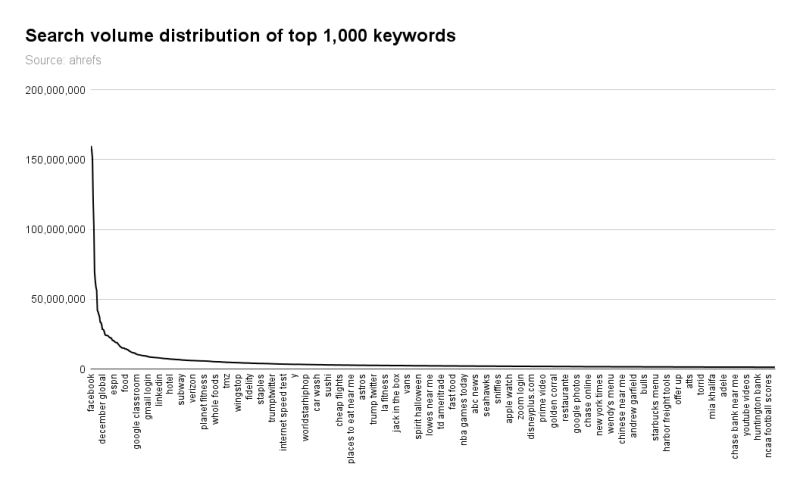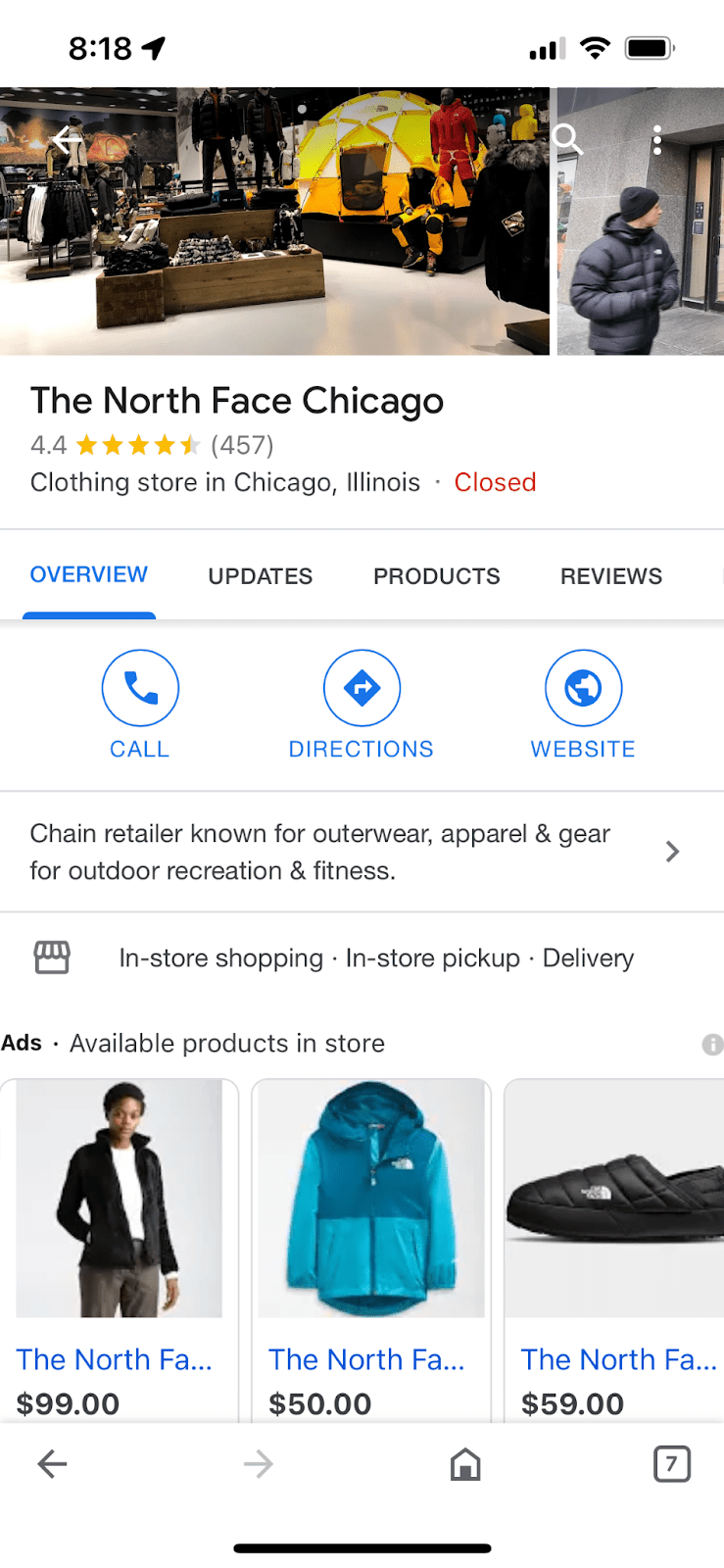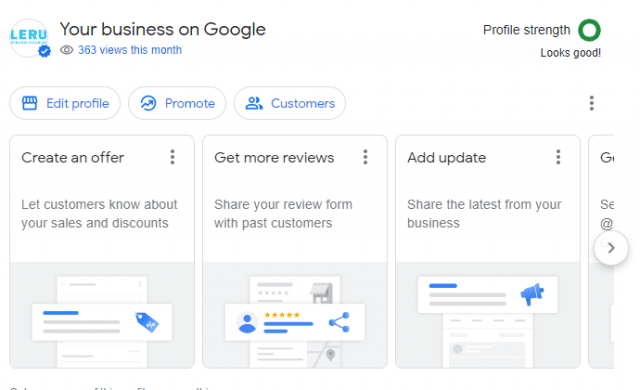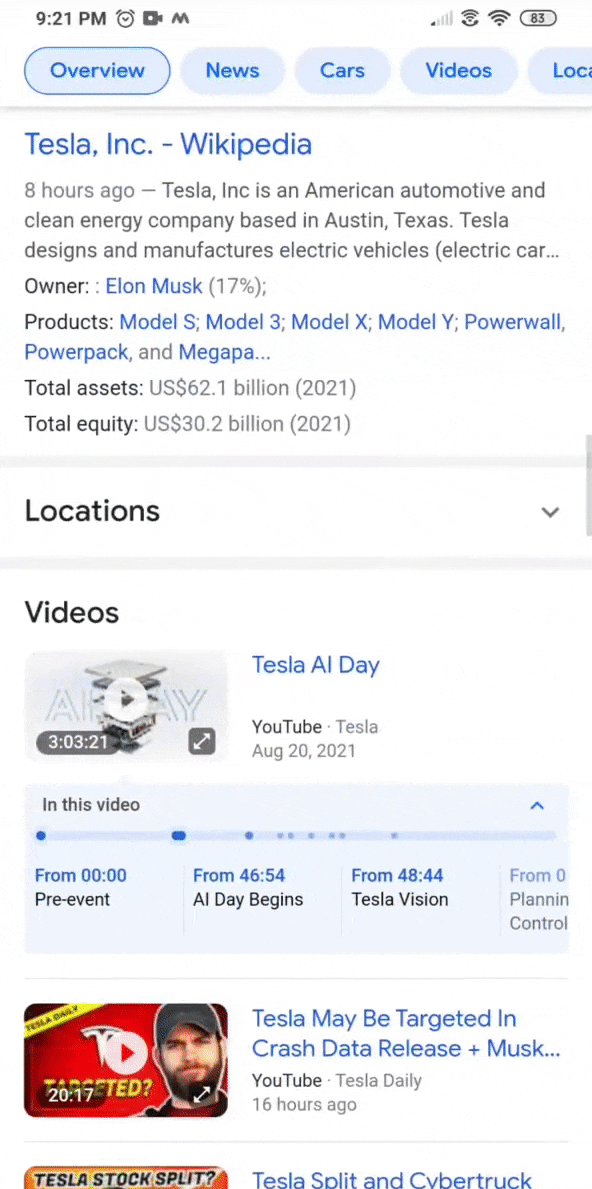In this week’s update, learn about the top 1,000 Google keywords; Meta’s plans to remake the Facebook feed; what The North Face gets right in localized marketing; a new profile strength widget in GBP; local packs are hidden under a new “Locations” tab; and John Oliver’s take on big tech monopolies.
Top 1,000 Keywords Feature Brands, Local
Shopify head of SEO, Kevin Indig, has a post on LinkedIn that offers a high-level analysis of the top 1,000 keywords by Google desktop search volume, sourced from Ahrefs. Indig finds that brands dominate the top 1,000, suggesting that many searchers intend to navigate to a brand website or nearby brand location. This includes digital, national, and multi-location brands; among the top multi-location names in the list, I noted Subway, Planet Fitness, Whole Foods, Wingstop, Staples, LA Fitness, Jack in the Box, Spirit Halloween, Lowes, Golden Corral, Wendy’s, Starbucks, Harbor Freight, and Chase Bank.
Local makes up a considerable proportion of overall searches, making up 34% of the top 1,000 terms according to an analysis by the team at Near Media, with “food near me” and “restaurants near me” ranking especially high. The Near Media stat includes the local brands cited above, as well as generic keywords and searches for local tools like Google Maps and Doordash. It finds that the proportion of local terms is roughly the same by volume as by count, suggesting that one-third of all desktop searches have local intent. The number of mobile searches with local intent is presumably higher; many today quote a stat sourced from Google that local searches make up 46% of all searches on desktop and mobile combined.
Courtesy Kevin Indig
Meta to Remake the Facebook Feed, Again
An internal memo leaked to The Verge reveals that Meta has plans to remake the Facebook news feed to add more content from outside the user’s immediate network, taking a tip from the For You page on TikTok. Facebook’s AI will recommend content based on the popularity of posts and their likelihood to appeal to the user, in addition to posts from a user’s friends, groups, and followed pages. The memo calls this a balance between “connected content and unconnected content.” The Verge surmises that the revised Facebook feed will be “a more visual, video-heavy experience.”
Aside from these TikTok-inspired changes, Meta will make Messenger more prominent within Facebook, with more explicit prompts to share posts via private message and a new inbox at the top right of the app screen, reversing the separation of Facebook and Messenger into separate apps back in 2014.
What The North Face Gets Right in Localized Marketing
In a post on Search Engine Land, Jason Tabeling offers an analysis of the online marketing strengths of outdoor clothing retailer The North Face, focusing on four key areas: local search, organic rankings, branded search, and website optimization.
On the local search side, Tabeling notes that The North Face has built out strong Google Business Profiles in order to capture traffic from consumers seeking local products. He notes that despite the growth of ecommerce, 80% of sales still occur offline, making local search one of the top priorities for any marketing strategy. The North Face has filled out its Google profiles with rich information, augmented with ads that showcase the availability of specific products in local stores.
Tabeling finds that measured against four competitors, The North Face has the highest number of ranked organic keywords, demonstrating that they have built a firm foundation in onsite SEO that can be boosted by paid search efforts. On the paid side, the brand has well-organized campaigns with all keywords mapped to landing pages and site links directing traffic to specific product lines. All these efforts work harmoniously to form a powerful marketing strategy that can serve as a model for other multi-location brands.
Courtesy Search Engine Land
Google’s New Profile Strength Widget for GBP
Google is testing a new widget in GBP that measures overall profile strength. The widget appears at the top right of the tools for business owners and managers in the GBP Search interface. Only a few users are seeing this widget for the time being, perhaps suggesting an A/B test whereby Google is measuring whether it has an influence on profile completeness. Presumably, the widget measures how many fields are filled out in the Business Profile, similar to the “Complete your Business Profile” widget that has appeared for some time on the Home tab in the GBP dashboard. Profile completeness is, as we know, the single most important factor determining local ranking, according to the latest Local Search Ranking Factors report.
Courtesy Zanet Design
Google Hiding Some Local Packs Under “Locations” Tab
For some searches where local intent may be less clear, Google is hiding the local pack under an accordion tab that shows the heading “Locations.” An example shared by Khushal Bherwani on Twitter shows the mobile SERP for “Tesla,” with results from Wikipedia and YouTube taking prominent positions and a local pack with nearby Tesla dealers hidden under a Locations tab. With mobile search real estate at a premium, Google seems to be playing with the idea of making local results less prominent when it infers a stronger likelihood that the user is searching for a general term.
John Oliver Takes on Google Search Hegemony
John Oliver’s HBO series Last Week Tonight has a new episode that addresses the allegedly monopolistic practices of big tech companies. Oliver takes aim at Apple for the 30% cut the company takes on app fees and its iron grip on app installation via the App Store, noting that Google’s Android platform at least permits app downloads outside the Play Store, even if few Android owners make use of the option.
But most of the episode is focused on Google’s dominance in search. Although back in 2004, the company claimed it wanted to “get you out of Google and to the right place as fast as possible.” Today, Google pushes tools like Maps and Google Flights to keep users on the platform. Oliver even cited the Sparktoro study, notorious in our industry, that claims two-thirds of today’s Google searches end without a click. Oliver also cites examples like featured snippets where Google borrows content from websites, discouraging users from clicking to learn more.
Though he cites the difficulty of any anti-monopoly legislation passing Congress, especially given many legislators’ ties to big tech, Oliver recalls our attention to the breakup of AT&T, which ultimately benefited users, who enjoyed more options and greater affordability due to increased competition.
Damian Rollison
Subscribe to Local Memo!
Signup to receive Local memo updates and the latest on localized marketing, delivered weekly to your inbox.



